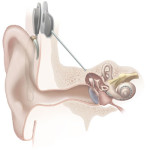 Our cochlear implant program offers patients with severe or profound nerve hearing loss the opportunity to hear. With evolving technology, patients who have too much hearing loss to be helped by hearing aids can now be made to hear through the use of a cochlear implant. Unlike hearing aids, most insurances cover this procedure.
Our cochlear implant program offers patients with severe or profound nerve hearing loss the opportunity to hear. With evolving technology, patients who have too much hearing loss to be helped by hearing aids can now be made to hear through the use of a cochlear implant. Unlike hearing aids, most insurances cover this procedure.
A cochlear implant is an electronic device consisting of two parts. The first part is an internal device that is implanted during a 2-3 hour surgery performed under general anesthesia via an incision behind the ear. The surgical site is usually well healed within 2 weeks and difficult to see thereafter. The second part of the cochlear implant system is an externally worn sound processor that looks much like a behind the ear hearing aid. The externally worn sound processor transmits speech and surrounding sound to the internal device, which in turn, sends the sound from the inner ear along the eighth cranial nerve to the brain.
Our program is unique in that we offer the longest electrode available that can improve speech comprehension. Specifically, the apex of the cochlea is stimulated with this longer electrode enhancing understanding. Med-el, the dominant implant company in Europe has shown the advantages of the longer implant. In addition the surgical approach is the “soft technique” which avoids excessive drilling of the cochlea and suctioning of the inner ear fluids. Round window placement which has been shown to be the preferable implant site is performed routinely in our implant candidates. This allows a longer insertion and improved comprehension.
Our pre-operative evaluation involves examination of the ear, routine audiology exam, C.T. exam and sometimes MRI exam of the inner ear. Our cochlear implant team includes otologist Leonard P. Berenholz, M.D., and audiologists John M. Burkey, M.A. and Kathie G. Griffith, M.A.
